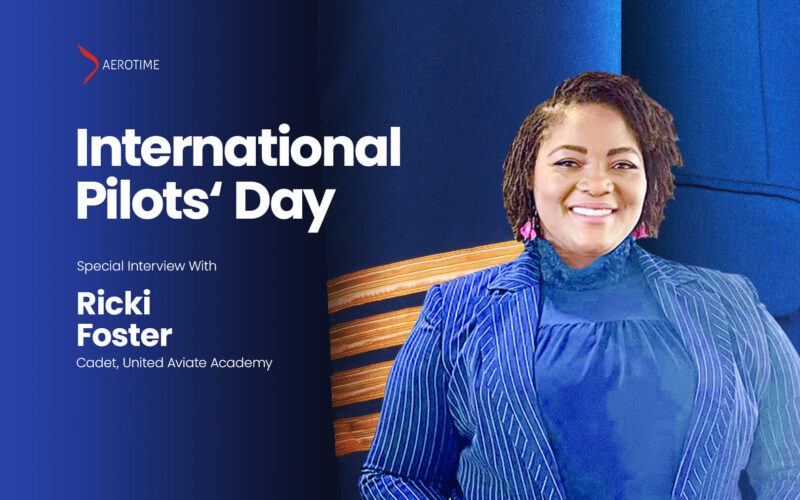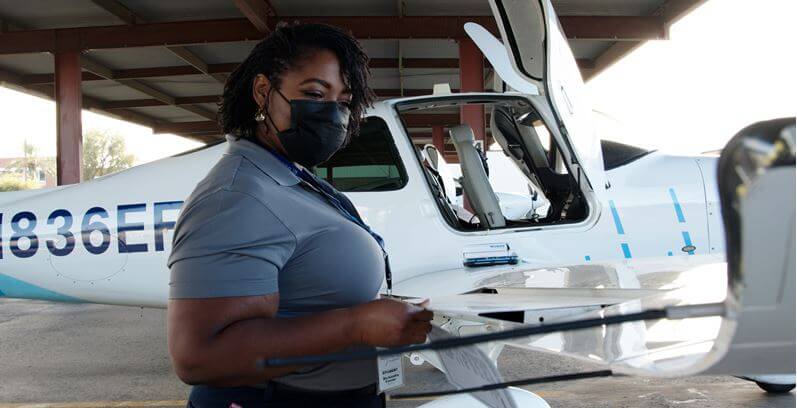Most people become pilots when they’re in their twenties and have dreamed of it since being a child. But not everybody! For our International Pilot’s Day coverage, AeroTime speaks to Rickiesha Foster, a cadet at the United Aviate Academy in Goodyear, Arizona,
Ricki started her pilot training at the age of 38. She’s also juggling training with bringing up her two children, which has surely helped hone her multi-tasking skills. She’s a great example of how major US airline United hopes to diversify its pilot pipeline through the United Aviate Academy.
It was while Ricki was working as a flight attendant that a female pilot suggested to her that she should look at becoming a pilot.
“She took me for a discovery flight. And I absolutely fell in love. I really enjoyed being a flight attendant. I loved aviation then, but I just didn’t realize that my true love would have been actually flying the aircraft,” Ricki recalls.
Ricki was working towards her private pilot’s license at her local school, flying a Cessna, when she heard about the United Aviate Academy and started to research it.
United took over the school from Lufthansa (LHAB) (LHA), making it the only major US carrier to have its own flight school. Diversity and inclusion is a big part of the school’s philosophy. The Academy aims to train about 5,000 new pilots at the school by 2030, with at least half women or people of color.
“It just spoke to me when I watched the video clips and I read what United was trying to do here,” Ricki explains. “I just knew that I wanted to be a part of that. I want to represent black girls everywhere. I want them to look into the flight deck and be like, ‘Oh my gosh, she looks like me’. I want to be a part of that change.”
The first class, which includes Ricki, reflects that initiative, with 80% of the cadets being women or people of color.
“I just thought it was so admirable for them to not only treat diversity in the flight deck as a thought, but to actually pursue it,” Ricki says of the Academy. “It’s a beautiful thing, everyone is represented here. Black, white, Hispanic, Asian, gay, straight, men, women, everyone is here. And that’s exactly what our customers look like, so this is what the flight deck should look like.”
Ricki also received a scholarship from the Organization of Black Aerospace Professionals, one of the groups that United teamed up with to try and open up funding to cadets from different backgrounds.
Ricki adds: “It opens up the pool, it gives us the ability, everyone the opportunity to pursue this dream that was so far-fetched for most of us.”
One thing that Ricki also appreciates at the United Aviate Academy is how they take the mystery out of becoming a pilot. For someone who doesn’t have any aviators in their family, it can be hard to know where to start.
“It takes the guesswork out of it, they have the structure, and step by step to explain to you what is required, how your training is supposed to go. And then they have the support there as mentors,” Ricki explains.
After all, were it not for that pilot’s encouragement, Ricki would not have thought about becoming a pilot herself. “If it wasn’t for that pilot, I would not have discovered this part of the industry, something I could step into and thrive here.”
Credit: United Aviate
Solo cross-country
Ricki’s favorite part of training is getting in the school’s Cirrus SR22 training aircraft, which have glass cockpits, like you would find in modern jet airliners, and, crucially for the Arizona heat, air conditioning!
While she of course remembers her first solo well, it was her first solo cross-country flight, leaving the confines of the airport and the training area, that was more satisfying.
“That’s when the training wheels really come off. Because you’re going through different air spaces, you’re talking to ATC by yourself, you have to look out for traffic,” she describes. “The first solo cross country was that ‘Aha, I’m really a pilot moment’.
Ricki says two stories have stuck with her through her training – one from a friend who failed a checkride and the other from someone who also failed a checkride but through a lack of confidence
“One is telling me failure comes, don’t beat yourself over it, fix whatever you didn’t know, and do it again. And the other one is saying you have to believe in yourself. Everybody else can’t do it for you, you must have the confidence.”
Advice for future aviators
Ricki is keen to inspire others and says no one should be put off becoming a pilot just because they don’t see people like them as pilots.
“For anyone who wants to become a pilot, I would say this: If you think it’s only for a certain demographic, why do you think so? And whatever the answer is, that’s exactly the right reason why you should be – because another person, when you become a pilot, will see you. And it demystifies a flight, it takes away that thought of ‘It’s only for a certain demographic.’”
For her children, it will be easier to get into aviation, thanks to Ricki’s experiences. But only if they want to!
“The lesson I’ve taught my children, not by words, but by my actions, is you can do anything you want to do. If you want to become a pilot. If you work hard at it, why not?”
The important thing is to find your passion, no matter what that is, Ricki declares. “So my children can become pilots. But it doesn’t matter what they want to become – a businessman, a businesswoman, doctor, a lawyer, a beautician, whatever.”
The crucial thing is that they learn that obstacles cannot hold you back, explains Ricki, citing her age, immigrant background, status as a mother and lack of finances as obstacles for herself. “Challenges are real. But I push past them. I make sacrifices and I work hard. And they will learn that from me. And that’s the secret sauce to any success you have.”


